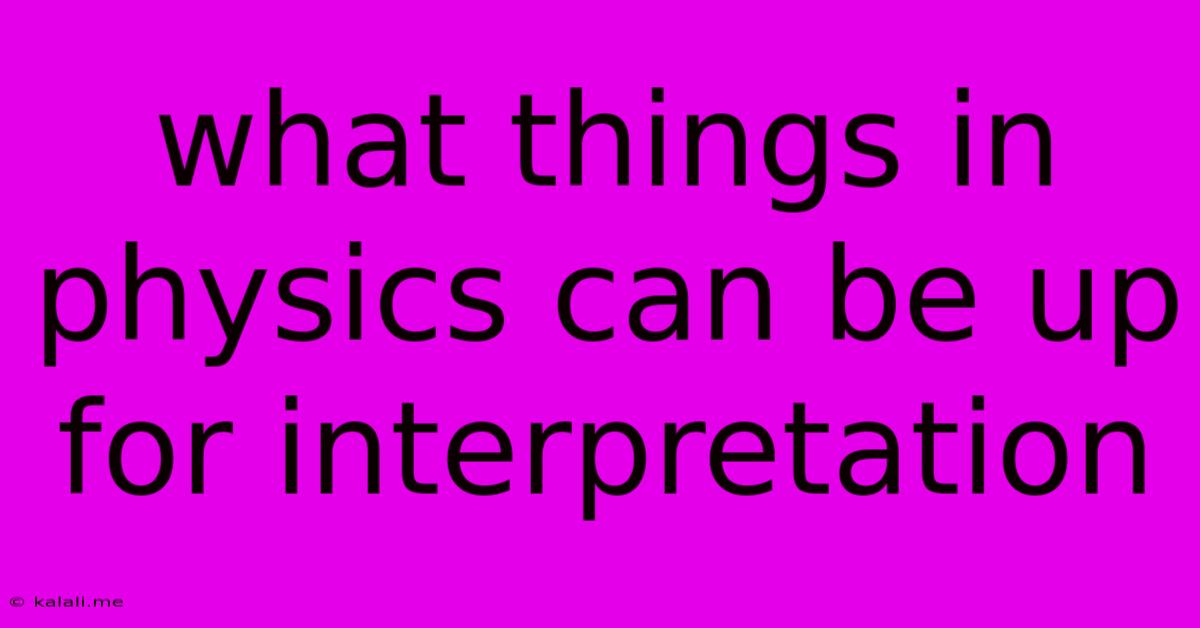What Things In Physics Can Be Up For Interpretation
Kalali
Jun 01, 2025 · 3 min read

Table of Contents
What Things in Physics Can Be Up for Interpretation?
Physics, often perceived as a rigid discipline of absolute truths and unwavering laws, surprisingly contains areas open to interpretation. While core principles like gravity and electromagnetism are well-established, the edges of our understanding, particularly at the quantum and cosmological levels, leave room for diverse perspectives and ongoing debate. This article explores several key areas where interpretation plays a crucial role in physics.
The nature of reality itself: Are we living in a deterministic universe governed by precise equations, or is there an element of randomness, chance, or even free will involved? This fundamental question impacts our understanding of everything else. The famous double-slit experiment, for example, highlights the wave-particle duality of quantum objects, raising questions about whether particles exist in a definite state until observed, a concept associated with the Copenhagen interpretation. Alternative interpretations, such as the many-worlds interpretation, propose different explanations for this seemingly paradoxical behavior.
Quantum Interpretations: A Landscape of Possibilities
The measurement problem in quantum mechanics is a prime example of interpretative freedom. Different interpretations offer varied explanations for the collapse of the wave function upon measurement:
- Copenhagen Interpretation: The most widely accepted (though not necessarily the most understood) interpretation, this suggests that the act of measurement forces a quantum system into a definite state. However, the nature of "measurement" remains a point of contention.
- Many-Worlds Interpretation: This postulates that every quantum measurement causes the universe to split into multiple branches, each representing a possible outcome. This avoids the wave function collapse but introduces the concept of a vast multiverse.
- Pilot-Wave Theory (de Broglie-Bohm theory): This proposes that particles always have definite positions and are guided by a "pilot wave," which determines their trajectory. This interpretation is deterministic but non-local, meaning that particles can influence each other instantaneously across vast distances.
The lack of empirical evidence to decisively favor one interpretation over others highlights the interpretative space within quantum physics. The choice of interpretation doesn't affect the predictions of quantum mechanics in most practical applications, but it significantly influences our philosophical understanding of the universe.
The Nature of Time and Space: A Cosmic Conundrum
General relativity, Einstein's theory of gravity, offers a different realm of interpretive challenges. While it successfully describes gravity as the curvature of spacetime, it struggles with singularities—points of infinite density like black holes. What happens at a singularity? Does time even exist in the same way we understand it? These are questions with no definitive answers, relying heavily on theoretical models and interpretations.
The origin and ultimate fate of the universe also involve interpretive elements. Cosmology relies heavily on models of the Big Bang and subsequent expansion. While the Big Bang is supported by observational evidence, details of the very early universe, such as inflation, are still subjects of ongoing research and debate, with various models and interpretations competing for acceptance.
The Role of Philosophy in Physics
The interpretive aspects of physics are closely intertwined with philosophy. Questions about the nature of reality, causality, determinism, and the limits of human knowledge are central to both fields. Physicists often engage with philosophical arguments to clarify their theoretical frameworks and guide their research. The ongoing interaction between physics and philosophy is vital for advancing our understanding of the universe.
In conclusion, while physics aims for objective, verifiable truths, the limitations of our current understanding, especially in quantum mechanics and cosmology, leave room for multiple interpretations. The choice of interpretation isn't always a matter of right or wrong but often reflects different perspectives on the nature of reality and the fundamental principles governing the universe. This inherent ambiguity, far from being a weakness, highlights the ongoing dynamic and evolving nature of physics, pushing researchers to explore the boundaries of our knowledge and question our deepest assumptions about the cosmos.
Latest Posts
Latest Posts
-
How To Plug Big Wholes With Waterproffing
Jun 03, 2025
-
Was Does Having The Bcm Flashed Mean On A Car
Jun 03, 2025
-
How Did Xavier Lose His Legs
Jun 03, 2025
-
How To Turn On A Bicycle Light
Jun 03, 2025
-
Why Did My Ac Unit Freeze Up
Jun 03, 2025
Related Post
Thank you for visiting our website which covers about What Things In Physics Can Be Up For Interpretation . We hope the information provided has been useful to you. Feel free to contact us if you have any questions or need further assistance. See you next time and don't miss to bookmark.